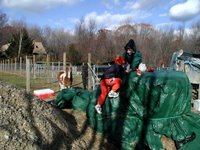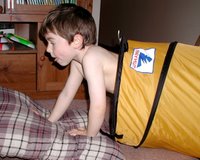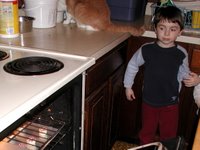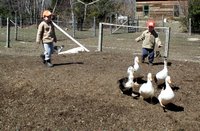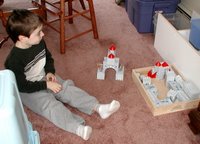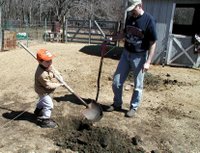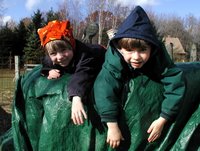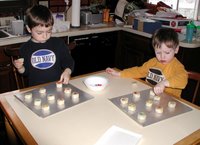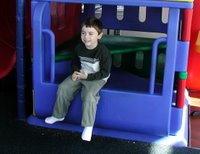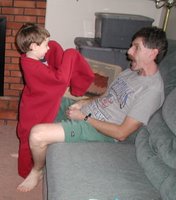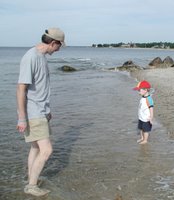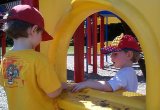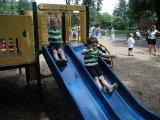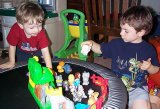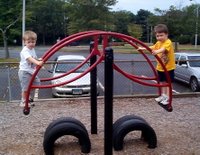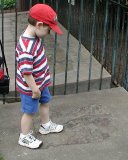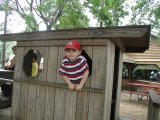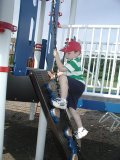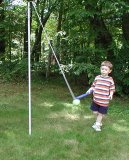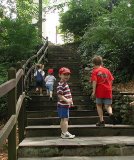
This photo, taken right as Jacob was mastering Stage 2, is a great example of referencing -- he's checking back with me to make sure I'm coming with him. Believe me, before RDI, this wouldn't have happened!! This was the big gain we had with mastery of Stage 2. He also became a master of reading my body language and facial expressions, which is useful in so many situations.
Here's a few of the Stage 2 activities I did with Jacob, and how I scaffolded them for initial success and building competence:
Referencing "red light, green light": this is the classic game where you turn your back and say "green light" as others playing the game sneak up on you, then turn around occassionally and say "red light!" and they all have to freeze. We started the game with the full version, saying "red light" and "green light!" as scaffolding, but then changed it to just the body language of having to freeze when the person turns around (without saying anything).
"follow my eyes to the prize" -- hide something under a set of cushions, or a set of pillows, or a set of beanbag chairs, or a set of cups, or a set of anything you could think to hide something under. (This is where that constant slight variations thing comes in -- you never do it quite the same way twice, so you are buidling in the "same but different" concept as you go along.) Then you look at where the object is and the child has to figure out where it's hiding based on where you're looking. Initially I scaffolded this by staring in an exaggerated manner (with my entire body) at where the object was hidden, even nodding my head at it. I also initially had the potential hiding places spread far apart. As he was successful, I'd make each time we played the game more challenging. So I starting leaving more and more of the body language out of it, so that he really had to focus on where I was looking, and I started moving the hiding places closer together so that he had to target in on which one I was actually looking at.
Another variation on this (working on a specific stage 2 objective): He had to visit the hiding locations and decide whether or not the prize was there by the expression on my face. I would smile if it was there, I would frown if not. Again, intially I really exaggerated the facial expressions, and even nodded my head yes or shook it no along with the expression, but then scaled that back as his competence with that type of activity grew, until it was just a slight smile or a slight frown that held the information.
Coloring: I would draw a series of shapes on a piece of paper and lay out crayons in front of him (far apart at first, then closer as he became more competent). He would reference me to see which crayon to use (which one I was looking at), then would have to follow my gaze to figure out which shape I wanted him to color in.
Board game: I would set out a board with dots on it (at first just a few dots spaced very far apart, but increasing numbers and closeness as he became more competent), then laid out a series of items in front of him (always something different -- plastic fruit, wood blocks, coins, straws, small rocks, little people figures, wooden train cars). As in the coloring activity, he would have to reference me for which item to pick up, and on which dot to place it.
Building games: I would set out a series of building materials (again, something different each time -- train tracks, legos, blocks, etc) and he would have to reference me to see which items to select and where to put them.
Feeding the cats (dogs, sheep, goats, ponies...): Jacob would fill a scoop with food, then have to reference me to figure out which bowl/bucket to pour it into.
Sorting laundry: I would make a couple piles of laundry, and Jacob would have to reference me as to which pile to choose an item from. Or I would have multiple laundry baskets, and he'd have to reference me as to which basket to throw an item from a mixed pile into.
Folding laundry: Same sort of thing, only I'd fold the clean laundry and hand it to him, at which time he'd reference me to see what pile to stack the item on.
Pick up: My favorite household activity, as the variation is already built in (the room is always cluttered by something different in different locations, and everything went in different types of boxes/bins). I would set out the bins and Jacob would reference me as to which toy to pick up off the floor, and which bin to put it in.
Cookie making: We used the pre-cut shapes type cookies, I started by handing him a raw cookie, and then he'd have to reference me as to where on the cookie sheet to place it. Eventually, I was handing him the entire sheet of cookie dough, and he was referencing me as to which cookie to select next. By that time, he'd already learned the correct location of where to place cookies on a cookie sheet, so his "need" to reference me was eliminated, hence we stopped "working" on that, as it made no sense to do that. Same thing happened with sorting laundry eventually -- he knew that the whites went in one and the darks in another, so stopped having a "need" to reference me, so I had to move on to other activties instead to work on referencing, although we did still use laundry sorting for other things (like master/apprentice work and regulation, and Stage 3 and 4 objective, when we got there).
Scrapbooking: I would scaffold this by cutting out pictures and pasting them onto colorful cut-out backgrounds, then I would apply paste, and hand it to Jacob, who would reference me as to where on the page to stick it.
We were still doing the above activities in the undistracting room. But by the end of working on Stage 2 (as seen in the photo), Jacob was able to attend to activities in the rest of the house in general, so I was able to start incorporating more "lifestyle" type activties (i.e., RDI intertwined throughout normal household activities and chores). This came at a good time for us, just as I headed off to a 2-day RDI presentation by Dr. Gutstein, and came home with the motivation to kick our RDI lifestyle program up a notch. More on that in another post!


